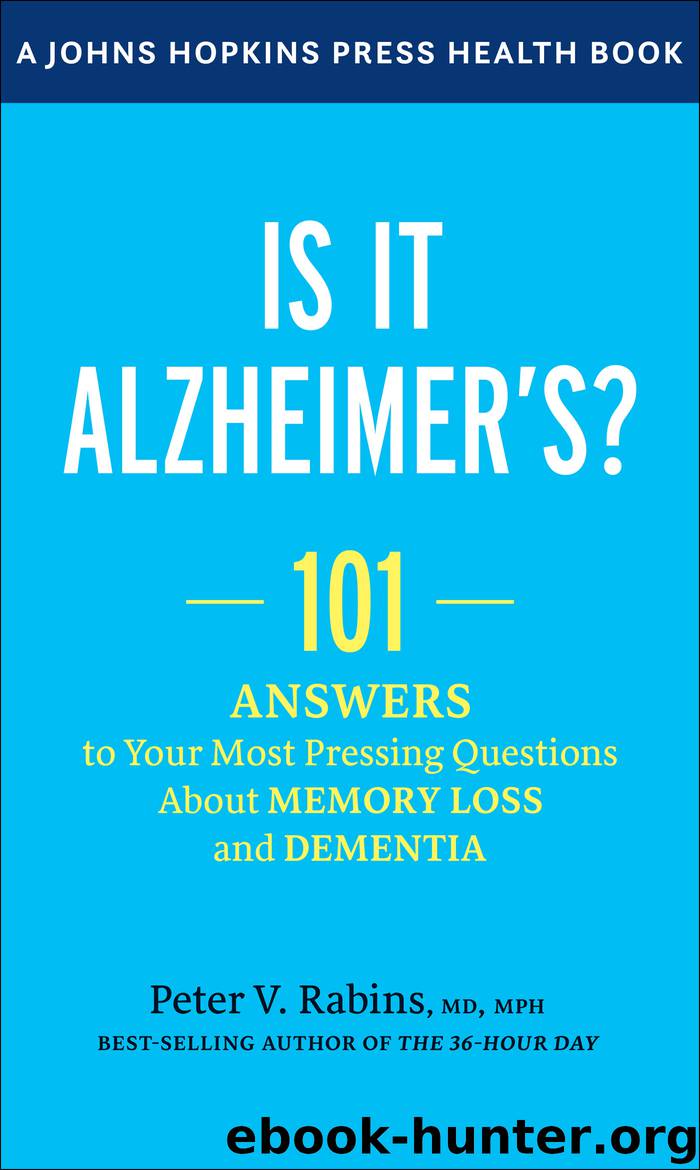Is It Alzheimer's? by Peter V. Rabins

Author:Peter V. Rabins
Language: eng
Format: epub
Publisher: Johns Hopkins University Press
Published: 2020-03-21T16:00:00+00:00
Q59. What is the difference between designating a power of attorney and identifying a durable power of attorney? Can I change my will if I have dementia?
A59. These are complicated legal matters, and you should consult an attorney about the specifics of your situation.
In general, a power of attorney document appoints the person named in the document as someone who can substitute for you in the ways that you specify in the document. For example, you might appoint someone as your power of attorney if you will be traveling and know that a document to sell property must be signed while you are away. Importantly, you must be competent when you sign a power of attorney document. If you later become incompetent, meaning you are not able to make decisions for yourself, then the power of attorney document becomes void.
Immediately after receiving a diagnosis of dementia, you should write a will and establish durable power of attorney documents for health and financial decisions, if you haven’t already done so.
For this reason, all states and the District of Columbia have established documents titled “durable powers of attorney” or some similar label. The key word is “durable.” This means that the document remains in force even if the person signing it becomes incompetent. These documents indicate whom you would want to substitute for you if you are declared incompetent. The specific mechanism by which a person is declared incompetent varies by jurisdiction.
Almost all jurisdictions separate the making of financial decisions (durable power of attorney for finances) from the making of health care decisions (durable power of attorney for health). Some states have added other categories. I believe strongly that all adults should legally identify a durable power of attorney because anyone can have an accident or develop a sudden, severe illness and become unable to make decisions for themselves. Unfortunately, most people do not have such documents. Receiving a diagnosis of dementia or a life-threatening condition such as cancer is often the trigger for doing so.
Many states also have established living wills or similar types of documents. In some states these documents are only applicable at the end of life, but many jurisdictions allow for people to express their health care wishes verbally to the person who will be making substituted decisions for them. In some jurisdictions, wishes about future care can be expressed in durable power of attorney documents.
There is a lot of variability about these issues, so it is important to be informed about the specific rules in the place where you live. You may be able to find this information online, from the attorney general’s office of your state. Many health care facilities have information about these matters, as do local departments of aging. Family attorneys and estate attorneys are knowledgeable about these issues.
Wills dictate what is to happen to people’s belongings, including money and property, when they die. If there is no will, the state will determine to whom and how the estate will be distributed. The opportunity to write a will was established by common law even before the United States became a country.
Download
This site does not store any files on its server. We only index and link to content provided by other sites. Please contact the content providers to delete copyright contents if any and email us, we'll remove relevant links or contents immediately.
Periodization Training for Sports by Tudor Bompa(8273)
Why We Sleep: Unlocking the Power of Sleep and Dreams by Matthew Walker(6725)
Paper Towns by Green John(5191)
The Immortal Life of Henrietta Lacks by Rebecca Skloot(4588)
The Sports Rules Book by Human Kinetics(4388)
Dynamic Alignment Through Imagery by Eric Franklin(4217)
ACSM's Complete Guide to Fitness & Health by ACSM(4060)
Kaplan MCAT Organic Chemistry Review: Created for MCAT 2015 (Kaplan Test Prep) by Kaplan(4012)
Livewired by David Eagleman(3775)
Introduction to Kinesiology by Shirl J. Hoffman(3773)
The Death of the Heart by Elizabeth Bowen(3622)
The River of Consciousness by Oliver Sacks(3604)
Alchemy and Alchemists by C. J. S. Thompson(3522)
Bad Pharma by Ben Goldacre(3428)
Descartes' Error by Antonio Damasio(3279)
The Emperor of All Maladies: A Biography of Cancer by Siddhartha Mukherjee(3163)
The Gene: An Intimate History by Siddhartha Mukherjee(3098)
The Fate of Rome: Climate, Disease, and the End of an Empire (The Princeton History of the Ancient World) by Kyle Harper(3067)
Kaplan MCAT Behavioral Sciences Review: Created for MCAT 2015 (Kaplan Test Prep) by Kaplan(2986)
